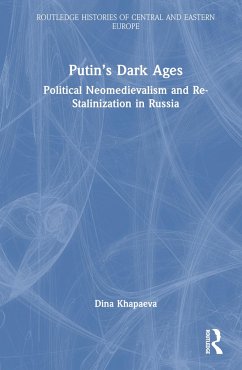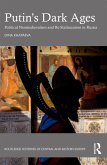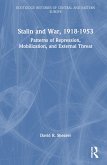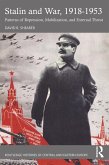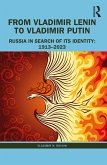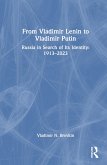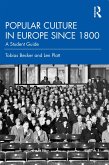Two decades before the war against Ukraine, a "special operation" was launched against Russian historical memory, aggressively reshaping the nation's understanding of its history and identity. The Kremlin's militarization of Russia through World War II propaganda is well documented, but the glorification of Russian medieval society and its warlords as a source of support for Putinism has yet to be explored. This book offers the first comparison of Putin's political neomedievalism and re-Stalinization and introduces the concept of mobmemory to the study of right-wing populism. It argues that the celebration of the oprichnina, Ivan the Terrible's regime of state terror (1565-1572), has been fused with the rehabilitation of Stalinism to reconstruct the Russian Empire. The post-Soviet case suggests that the global obsession with the Middle Ages is not purely an aesthetic movement but a potential weapon against democracy.
The book is intended for students, scholars, and non-specialists interested in understanding Russia's anti-modern politics and the Russians' support for the terror unleashed against Ukraine.
The book is intended for students, scholars, and non-specialists interested in understanding Russia's anti-modern politics and the Russians' support for the terror unleashed against Ukraine.
"In Putin's Dark Ages, Dina Khapaeva offers an original interpretation of the Russian president and his apocalyptic, reactionary worldview, arguing that it is not just neo-Stalinist, but neo-medievalist: clearly written, deeply researched and thought provoking."
Anne Applebaum, The Atlantic, USA
"In this fascinating and innovative work, Dina Khapaeva offers a new perspective on the Putin regime as part of a wider cultural phenomenon, that of neomedievalism in the totalitarian political imagination. This book is a must for those seeking to understand Putin's war on Ukraine and his politics of memory."
Serhy Yekelchyk, University of Victoria, Canada
"An illuminating inquiry, a necessary book to understand the nature of Putinism - combining Restalinization with a multifaceted Neomedievalism. A severe dissection of a terrorist regime."
François Hartog, École des hautes études en sciences sociales, France
"Putin's Dark Ages is a strikingly timely intervention in the study of Russian history, memory, and politics. Before February 24, 2022, it was still possible to argue that the phenomena covered in this book-neo-medievalism, neo-Eurasianism, the celebration of Ivan the Terrible and Joseph Stalin, etc.-were curious, but marginal developments. As Khapaeva compellingly shows, they are in fact crucial and central features of Russian society today-symptoms of a distinctive anti-modern worldview that has gained an extraordinary and inimical potency."
Kevin M.F. Platt, University of Pennsylvania, USA
Anne Applebaum, The Atlantic, USA
"In this fascinating and innovative work, Dina Khapaeva offers a new perspective on the Putin regime as part of a wider cultural phenomenon, that of neomedievalism in the totalitarian political imagination. This book is a must for those seeking to understand Putin's war on Ukraine and his politics of memory."
Serhy Yekelchyk, University of Victoria, Canada
"An illuminating inquiry, a necessary book to understand the nature of Putinism - combining Restalinization with a multifaceted Neomedievalism. A severe dissection of a terrorist regime."
François Hartog, École des hautes études en sciences sociales, France
"Putin's Dark Ages is a strikingly timely intervention in the study of Russian history, memory, and politics. Before February 24, 2022, it was still possible to argue that the phenomena covered in this book-neo-medievalism, neo-Eurasianism, the celebration of Ivan the Terrible and Joseph Stalin, etc.-were curious, but marginal developments. As Khapaeva compellingly shows, they are in fact crucial and central features of Russian society today-symptoms of a distinctive anti-modern worldview that has gained an extraordinary and inimical potency."
Kevin M.F. Platt, University of Pennsylvania, USA

